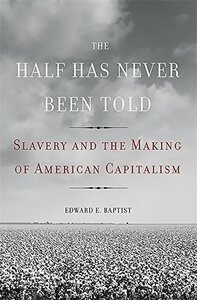Take a photo of a barcode or cover
207 reviews for:
The Half Has Never Been Told: Slavery and the Making of American Capitalism
Edward E. Baptist
207 reviews for:
The Half Has Never Been Told: Slavery and the Making of American Capitalism
Edward E. Baptist
The Half Has Never Been Told: Slavery and the Making of American Capitalism by Edward E. Baptist is a history of slavery spanning from pre-Revolution America to the Civil War. The chapters are broken down by time period and Baptist incorporates narratives from the lives of slaves into the historical facts of the past. The book explores the expansion of slavery and its relation to other historical events, like the slave revolution in Haiti that precipitated the Louisiana Purchase and expansion of slavery westward in North America. Ultimately, Baptist explores slavery as the foundation of the United States economy and how it is inseparable from the history of the nation as a whole.
This book is a hard read. I find it incredibly difficult to read about just how cruel people can be--and how it can be endorsed by the majority of an entire nation, my nation. The book is still an incredibly important history and tells a story that we often like to ignore. I think histories like this should be well incorporated into the histories we teach in schools and yet I found so much information in this book that I knew little to nothing about. Not only does Baptist tell an incredibly important history here, he also exposes the gaps left in the histories we're taught in the United States. I think this book is an incredibly important read and I highly recommend it.
Damn cotton capitalism. Baptist condemns historians for failing to push academic debates and bold questions out among the general public. The field, he suggests, has not been forthcoming about some essential things:
• Slave labor camps drove the globe's most effective economic growth, ever - for 70 years. The primary technologies that allowed for this growth were not machines, devices or tools - but torture and measured labor surveillance
• Massive parts of the U.S. economy, institutions and culture are grounded in a consensus among white settler elites to plunder land from indigenous people and other nations, raze local ecosystems, then force African migration and agricultural cultivation
• Enslaved people freed themselves - after many generations of steadfast survival
Baptist answers, in 400-odd pages and many ways: What does American slavery have to do with me, with now? He makes clear, cogent connections - state politicians and bank securities, Congress and presidents, the Supreme Court and landless settler migrants, steamship companies and international immigrants into textile mills ... all depended on the continuation, and often expansion, of a wickedly innovative economic model based on disembodied, disenfranchised, disfigured Black labor.
The paperback afterword acknowledges brilliant thinkers who shaped Baptist's capacity to finish this twelve-year commitment, including CLR James, his Black South Carolina teachers, and Pauli Murray. He also recognizes the fortuitousness of publication during a moment heated with discussion over reparations, and the power of a spectacularly bad anonymous review in the Economist.
An intricate well developed account of the events that build up America as the nation that is today. As a student studying American history from 1861 onwards, the last section was definitively related to my study. As a main thesis, the history of America retold by many historians of the past had often given excuses towards the actions commited by individuals such as Johnson towards the rebuilding of America as the good of the nation. An interesting viewpoint is the idea that the North was not against slavery because of it's moral wrongs, but due to long lasting effects on their side for the advantages of cheap labour and further building. It explores the emotional struggles of those that have lived through these time periods, by having their stories silenced as a result of limitations to their freedom of speech.
The accounts collected in here by the author had me quite distracted from the real descriptions of the history that took place, which was a negative side to it. Overall, it was intricately written and develops the real issues of the slave trade, towards not only binding a whole nation, but significantly in their development and life chances in the long run.




